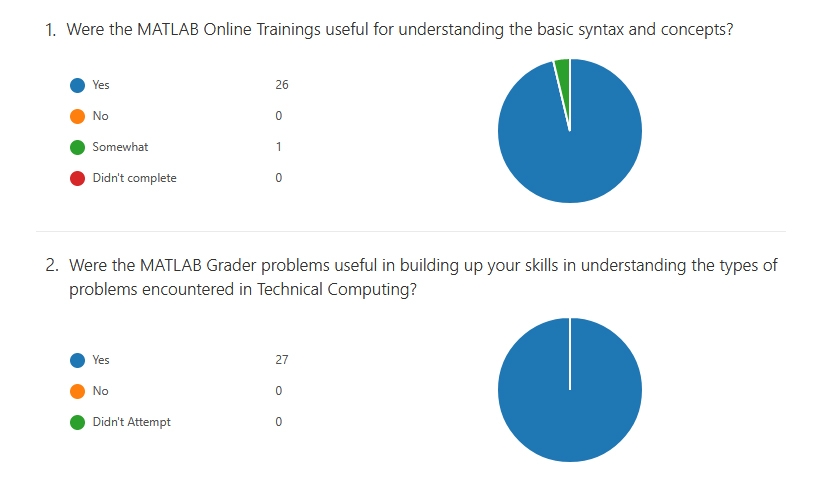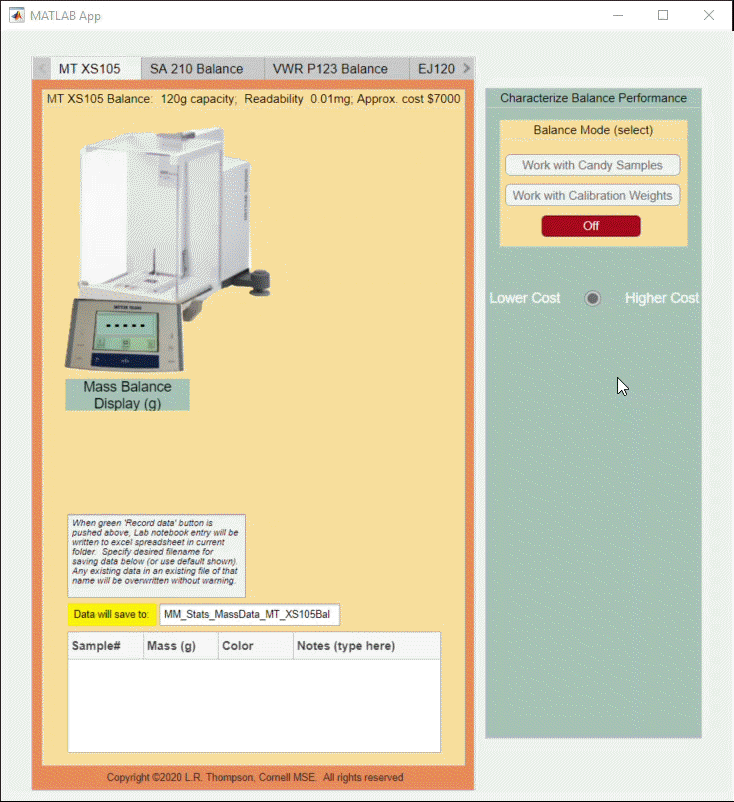結果:
let me invite you to distant Second international conference "MATLAB and computer calculations in education, science and engineering" April 26 – 29, 2021 р., Kyiv"
First communication
It is impossible to imagine recent science and engineering without mathematical packages like MATLAB, MathCAD, Mathematica, Maple etc. However, they have not been sufficiently used in education yet. To improve the situation we manage these conferences. This will be the Second conference in Ukraine. The First was carried out in May 2019. Its results may be seen here. Unfortunately, it should be carried out remotely this time. However, it is to happen to have the tradition saved!
Scientists, engineers, educators from universities and high schools are welcome! Regretfully, we need to restrict the scope of topics to be considered this time. They are to be associated with education in university or school, methodology of mathematical package application, teaching disciplines with them. Variety of problems we see in such a way this time:
Problems and sections: MATLAB and computer use in universities MATLAB and computer use and computer use in high school
Conference will be held remotely under supervision of National aviation university (Kyiv). Like last time, (remote) master classes will be carried out to, from our point, to facilitate MATLAB use for beginners in education. To facilitate remote participation of foreign guests, two kinds of sessions will be managed: Morning sections, 10 a.m. – 15 p.m. Kyiv’ time will use Ukrainian and Russian languages. Evening sections, 18 p.m. -:- 21 p.m. Kyiv’ time but 10 a.m. – 1 p.m. in San Francisco will use English, for participants from Europe and USA.
Organizational Committee and rules for Abstracts may be seen here, or in department site or asked for per e-mail Ye_Gayev@i.ua and YevgenyAlGayev@gmail.com
Important dates Till April 10, 2021 – registration via form or directly via above addresses. Till April 20, 2021 р. – accepting Abstracts, 4 pages prepared on rules. Opening the conference April 26, 2021. Conference days 26 – 28, April 2021. Book of Abstracts will be placed in the Internet and in https://www.academia.edu/; DOI will supplement them.
It is important that three master-classes are to be carried out in Saturday and Sunday, April 24 and 25. Their topics are:
1. Prof. Yevgeny Gayev (NAU) «Algorithms that inspire to education»; 2. Prof. Sergii Iglin (Kharkov) «Heat Transfer problems with MATLAB»; 3. Prof. Sergey Sylantyev (Kyiv Nat. univ.) «AWS Cloud Services and Cloud Calculation».
Potential participants are kindly asked to register as soon as possible for enabling our next management steps!
Hi, MathWorks / MATLAB / Simulink community! I have recently started working my way through the book mentioned in the topic, and I am wondering if anybody out there would be interested and have time to help me review some of my work on the exercises. Specifically, I'm currently working "Exercise 7.9 - Challenge: Design of a Type 2 PLL" and I am not convinced that my implementation is correct, but I'm having some trouble with debugging.
Is anyone interested and have time to review my implementation and give some feedback? I'd definitely appreciate it.
Thanks!
Shaun Lippy Middleburg, VA, USA
ASME will be hosting a four-part conversation series from March 22-25, that will educate and equip mechanical engineers with workforce strategies. The series will bring together leaders and industry experts in education to explore which new skills will be taught to young engineers, what training mid-career engineers need in order to return to work as the pandemic subsides, and how much more can be done to confront the labor and skills gap in 2021 and beyond.
I was honored to be asked to participate in the first panel discussion along with distinguished faculty from MIT and the University of Colorado Boulder. I would encourage all of our customers involved in online teaching and learning to attend. More details on the panel discussion that features MathWorks response to COVID-19 are below:
The Evolution of Engineering Education Post-COVID-19 (March 22): The transition to remote learning was a shock for many universities and colleges across the country. Professors had to transform their in-person lecture into an engaging online class, and students had to take on more self-learning responsibilities. What impact will this change in teaching have on the future of education? This conversation will focus on the shift to online education at universities, the digital engineering skills students will need to learn, and how academia and industry can work together to prepare the young engineers entering the workforce.
The Evolution of Engineering Education Post-COVID-19 : https://app.webinar.net/vlOW9kK90wm?mcc=EDIT
I just started my MPhil in power systems and we are doing load flow analysis. I am completely lost throughout the gauss seidel and newton Raphson methods using MatLab. can I get help, please?
This is a great presentation from 2 professors introducing how they use MATLAB in their physics courses. MATLAB Grader and Live Scripts are discussed in detail.
Here is the abstract:
-----
Guest Presenters: Michele McColgan, Siena College and Duncan Carlsmith, UW Madison
The meeting will start with short presentations, and then we'll have time for questions and discussion in a colloquial setting. The presenters use MATLAB in their courses, and this meeting will provide a good opportunity to see the functionality that MATLAB affords. However, the presenters' approach to integrating computation is relevant generally; thus, this meeting should be of great interest, even if you are not a MATLAB user.
-----
Webinar from PICUP .
Prof. Duarte Antunes from Eindhoven University of Technology explains how he's been using MATLAB live scripts for teaching an online "Optimal Control and Dynamic Programming" course.
WiDS Datathon 2021 is going on right now. The focus of the Datathon this year is "on creating models to classify whether patients have been diagnosed with a certain type of diabetes." You can register and participate until March 1.
Also, take a look at this blog post on the MATLAB benchmark code for this datathon.
MATLAB Benchmark Code for WiDS Datathon 2021
There are also various online challenges by MathWorks that students may be interested. Here are the winners from last year's Simulink Student Challenge. There was also a MATLAB Online Live Editor Challenge a couple of years ago.
Hello , I wonder how to determine continous or discrete time modelling.For example if I want to run my model in MCU in this case discrete model is suitable?I am a bit confused
Happy New Year, everyone! We hope you enjoyed the Cody contest in 2020, learned new MATLAB skills, and made a friend or two. While the 2020 contest has concluded, the fun and learning never end.
Please take the 1-minute survey to talk about your experience (only 2 required questions). Our goal is to make future contests better and more appealing to you, so your feedback is critical to us.
Thank you in advance and hope to see you again in the 2021 contest.
Here's an example of virtualizing a lab course.
I am currently working on simulink online but I cannot maximize the screen
Just making sure people are aware of our new Onramp courses. These are great self-learning resources for students.
Released a few months ago:
Released this month:
How do you teach subjects like Programming and Numerical Computing hands-on in these challenging times?
Prof Chiranjoy Chattopadhyay at the Dept of Computer Science and Engineering at IIT Jodhpur shares his innovative approach to teaching at a distance in this new Technical Article on Teaching Parallel Computing Online with MATLAB.
The course utilized MATLAB Online , MATLAB Onramp and MATLAB Grader to train students in the basics of technical computing, in addition to using a Hands-on Online GPU workshop organised with the MathWorks Education Team. As a result of this approach to distance teaching, the students have reported good levels of understanding in the main learning outcomes of this course, as indicated in the survey results (below):

Please consider trying out the links above to check if your course might benefit from a similar approach, and feel free to message us if you are interested in learning more.
I just highlighted an app on File Exchange for emulating an experiment. Great idea for doing lab classes with software. What I like about this app is that it incorporates statistical variance and measurement noise that comes from physical experiments.
Read more about it here:
https://blogs.mathworks.com/pick/2020/11/20/emulating-a-physical-experiment-of-measuring-mms/

I would like to plot 2 discrete vectors on one graph created as follows: u=1; X={u,2*u,3*u,4*u,5*u,6*u,7*u,8*u,9*u}; Y={u,3*u,5*u,-u,-6*u,u-u,u^2,u^3,u^4}; stem(X,Y) unfortunately system returns error how to do it properly?
Here's a short article describing how educators from UNSW have used Live Scripts to help students understand mathematical models. Interactive live scripts allow students to experiment and understand concepts through trial and error. The article also explains how the scripts helped provide an enriched online learning experience for the students.
Do you use Live Scripts in your teaching?
I often code snippets to students in the question description. I would like the students to be able to copy and paste these from the description into their solution, obviously all on the same web page. I thought this was the case before, but now Ctrl+C/V do not work and when I right click there is no copy/paste options. Is this not possible?
